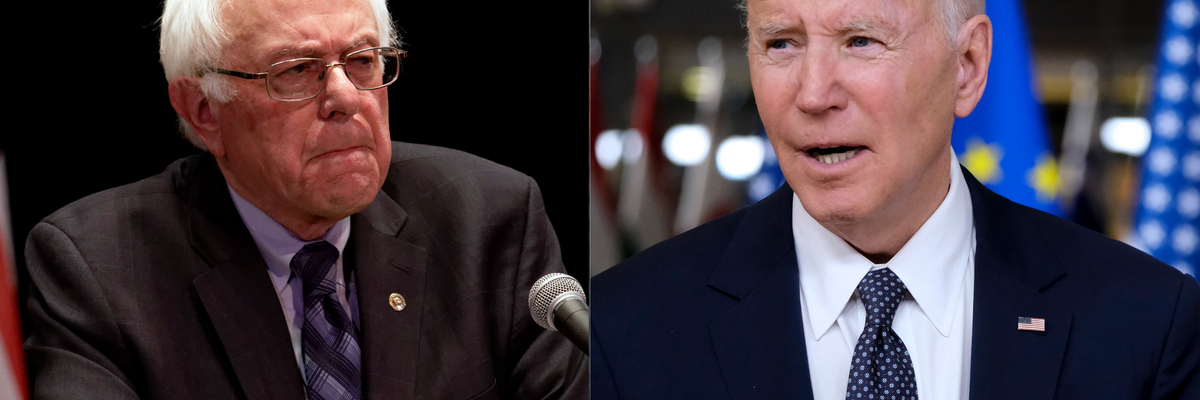On Tuesday evening, Sen. Bernie Sanders (I-Vt.) withdrew his war powers resolution to end U.S. support for the Saudi-led coalition’s brutal war in Yemen in return for a promise from the Biden administration to work with him on ending U.S. involvement in the conflict.
The resolution faced stiff opposition from the administration, which mounted a vigorous lobbying effort against the measure’s passage. If passed, the resolution would have impeded the Saudis’ ability to re-initiate airstrikes on Yemen by banning any future U.S. support for aggression by the Saudi-led coalition. The Saudi-led coalition launched its war on Yemen in 2015; the conflict has killed almost 400,000 civilians and left 23 million in desperate need of humanitarian aid.
In a speech on the Senate floor announcing the measure’s withdrawal, Sanders reported that his office had received a commitment from the Biden administration to work with Sanders to "craft language that would be mutually acceptable” in order to “end the war in Yemen.” Absent such agreement, “I assure the members we will be back with a resolution in the very near future” to end U.S. complicity in the brutal and bloody war, Sanders pledged.
The withdrawal of the measure — which received broad, bipartisan support from more than 100 organizations, including the Quincy Institute — is a victory for the Biden administration, which tried to whip up opposition to the resolution (despite many of President Biden’s senior aides having previously supported a Yemen war powers resolution during the Trump administration).
In a letter sent to congressional leadership last week, the White House stated that U.S. support to the Saudi-led coalition “does not involve United States Armed Forces in hostilities with the Houthis for the purposes of the War Powers Resolution.”
The Trump administration made a similar argument in 2019, before Congress successfully passed the WPR and Trump vetoed it. In both cases, congressional advocates reiterated that it is not under the purview of the executive branch to define the meaning of hostilities: constitutional war-making authority resides with Congress, and Congress can define hostilities as it sees fit.
The opposition from the White House might appear counterintuitive, given that Biden had expressed anger at Saudi Arabia’s role in causing OPEC+ to cut oil production just weeks before the midterms, and had asked Congress to take the lead on “rethinking” the U.S.-Saudi relationship.
The administration justified its opposition to the resolution by citing its efforts to bring peace by helping the UN to broker ongoing negotiations between Saudi Arabia and the Houthi government in Sanaa. These efforts have succeeded in halting Saudi airstrikes for the past nine months and easing some aspects of the Saudi blockade on essential imports to Yemen, which has caused an intense humanitarian crisis.
In talking points circulated against the resolution, the administration claimed that the situation is “fragile” and congressional assertion of war powers to ban future U.S. support for Saudi aggression risked “undermining” diplomatic efforts. However, advocates of the resolution such as Sanders and Sen. Chris Murphy (D-Conn.) asserted that they could see no justification for the United States playing any future role in assisting Saudi aggression in Yemen, given the massive civilian deaths in Yemen and the repeated war crimes of the Saudi-led coalition over the past seven years.
In October, UN Special Envoy for Yemen Hans Grundberg tried to extend the truce for a further six months. The Houthis demanded that the Presidential Leadership Council, or the internationally recognized government of Yemen, pay public sector salaries, including those of fighters. The PLC refused, and the truce expired. Major hostilities have not resumed in the intervening two months, but especially given the expired truce, there is an ongoing risk that the Saudis could resume their assault and blockade of Yemen.
Yesterday’s events may embolden the many members of Washington’s foreign policy elite who would like to ensure that the president’s capability to unilaterally wage war remains unchallenged by Congress’s constitutional prerogative over matters of war and peace.
But we shouldn’t reduce yesterday’s events to just another political parlor game. The resolution’s withdrawal in the face of White House pressure signals ongoing U.S. support for the Saudi-led war, despite consistent evidence that Saudi Crown Prince Mohammed bin Salman is no friend to the United States and its interests. Continuing to provide U.S. assistance demonstrates that the administration has chosen the dysfunctional U.S.-Saudi relationship over Yemeni civilians who have suffered greatly as a result of a war and blockade facilitated by U.S. support.
To be clear, the war powers resolution would not have necessarily ended the conflict in Yemen: it would have only ended U.S. complicity in one of the world’s worst humanitarian crises. Critics expressed concern that it could embolden the Houthis to reinitiate hostilities against Saudi Arabia or push to further consolidate power. However, in order to move the war towards resolution, the first step is to end the possibility of Saudi-led airstrikes and to return control of the conflict to the Yemenis themselves.














